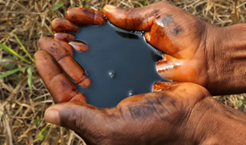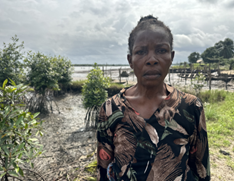The Ogoni (HIIN=29)
The Ogoni, 850,000 strong, live in Ogoniland in the Rivers State of the Niger Delta. They work in agriculture and fishing and
cultivate palm oil. They practice Christianity (mostly Protestant) and animism - worshiping their river as a god (as we Celts did).
They operate a political hierarchy: the Gbenemene, or 'king', rules over the kingdom. The Mene Bua, or
'high chief', rules over a group of villages/towns. The Mene Buen, or 'chief', governs a single village/town.
A 'lower chief' or Mene Zeu rules subdivisions of this.
When Royal Dutch Shell began oil extraction in 1958, in Ogoniland, Nigeria was still (and for a further 2 years) an English
colony. Over 15 years, an estimated 2.1m barrels of oil were spilled (40% of the global oil spills by Shell), damaging the
environment and people's livelihoods.
In 1990, Ken Saro-Wiwa, a poet and writer, and eight others, led a campaign against the plunder of Ogoni resources.
The Movement for Survival of Ogoni People (MOSOP) was established and it joined Unrepresented Nations and Peoples
Organisation (UNPO). The Movement sought economic development and autonomy. They produced an Ogoni Bill of Rights, addressed to
and ignored by the Nigerian Government, demanding $6bn for social and economic recovery and $4bn to address environmental
destruction. Reflecting overwhelming incidences of lung cancer, asthma and bronchitis, an excerpt reads:
"The Ogoni people want.. Freedom from oppressive and discriminatory Nigerian laws. Freedom from Shell's ecological war
that sends over 200 Ogonis to untimely graves every week". https://unpo.org/
In 1993, MOSOP mobilised over half the Ogoni people, in peaceful marches, to demand a share of oil revenue, greater political autonomy and other rights.
It was the call for self-determination which led Shell and the Nigerian Government to see MOSOP as a threat. Over 4,000 Ogoni were killed in the years
following 1993, from state-sponsored terrorism. Many leaders of MOSOP were killed in violent clashes. Official policy set factions of the Ogoni
The United Nations Environmental Programme's (UNEP) Environmental Assessment of Ogoniland, which was published in 2011, noted that restoring
the environment would take decades.
Fisheries and agricultural land in Ogoniland were destroyed by oil spills. Associated fires killed vegetation, leaving a crust
of ash and tar, making soil recovery difficult. Furthermore, the Ogoni were exposed to high concentrations of hydrocarbons in
the air, water and land. Gaseous fractions of crude were burned off, with gas flaring, which put toxic pollutants into the
atmosphere. Groundwater was contaminated with carcinogens. High rates of infant mortality have persisted, for example, with
4 out of 10 children dying within 3 months of being born.
A military crackdown began in May, 1994, when four pro-government Ogoni leaders were killed, in disputed circumstances. The
Nigerian Government arrested Ken Saro Wiwa and his colleagues - Saturday Dobee, Nordu Eawo, Daniel Gbooko, Paul Levera,
Felix Nuate, Baribor Bera, Barinem Kiobel and John Kpuine. They were imprisoned, at Bori Military Camp, for a year.
They were declared guilty by a tribunal and hanged, in November 1995. Many witnesses against the Ogoni Nine during their trial,
later recanted, admitting to accepting Nigerian Government bribes and employment with Shell.
The Rivers State Internal Security Task Force (a military unit) then embarked on raids on Ogoni villages, with human rights
abuses, including extrajudicial executions, indiscriminate shooting, arbitrary arrests, floggings, rapes, looting and extortion.
Military checkpoints were established across Ogoniland. Suspected members of MOSOP were arrested. Many of those taken in were
never seen again. Shell was alleged to have provided the Nigerian army with vehicles, patrol boats and ammunition and to have
helped plan raids and terror campaigns.
Beginning in 1996, the Wiwa family brought three lawsuits against Shell, its subsidiary Shell Nigeria and the subsidiary's CEO
Brian Anderson, in the United States District Court for the Southern District of New York, under the Alien Tort Statute, the
Torture Victim Protection Act and Racketeer-influenced and Corrupt Organizations Act (RICO). The lawsuits were filed by the
Center for Constitutional Rights (CCR) and co-counsel from EarthRights International. Finally, in 2002, the Supreme Court
reversed a previous dismissal, ruling that the plaintiffs could proceed. In 2005, the Nigerian federal high court judge ruled
that the gas flaring in the Niger Delta violated the rights to life, health, and dignity of the region's residents. Oil
accounted for 80% of Nigeria's export income at the time. After 12 years of Shell petitioning courts not to hear the cases,
they were heard, in 2009. {The Irish Corrib Gas Field (Co Mayo) also evoked controversy about Shell operations.}
http://www.shelltosea.com/content/overview-corrib-gas-project
In June 2009, the court case of Saro-Wiwa Vs Shell reached a $15.5m settlement. The oil giant agreed to pay $15.5m (9.6m pounds) to
settle a legal action in which it was accused of having -collaborated in the execution of the poet, Ken Saro-Wiwa, and eight
Ogoni leaders. The settlement, reached on the eve of a trial in a federal court in New York, was one of the largest payouts
by a multinational corporation.
Out of the $15.5m settlement, $5m was used to set up a trust called Kiisi - meaning 'progress' - to support
developmental initiatives in the Niger Delta, including education in the Ogoni languages: Khana, Gokhana, Eleme and
Tae, which form a distinct Benue-Congo linguistic group.
Media reports, in 1999, indicated that MOSOP is still fighting for economic justice and human rights - including the right to
choose how their land and resources are used - and a future free from violence.
All human beings are equal in value and their humanity cannot, in any artificial way, be duly ranked below that of others.
Human life is precious and should not be subjected to cruel treatment and judicial murder. Those who kill Ogoni people or create
circumstances where they suffer and die have to be asked to account for themselves.
Buíochas le Dia (Aistriucháin ón Íogbóis)
2025 - Shell Oil ignored clean-up 'Scam' Warnings.

A 2025 BBC investigation found that Shell Oil ignored several warnings that the promised clean-up of oil-polluted areas,
inhabited by the Ogoni, was frustrated by inaction and corruption. Shell Oil and the Nigerian government had claimed that work,
in oil-contaminated areas, had been doing well for the last decade. Locals have said, however, that the clean-up efforts were a
'scam' - which just wasted money.
In 2011, the UN's Environment Programme (UNEP) published a major study into the impact of pollution in the oil-rich area. It
found people were drinking water, contaminated with benzene, a known carcinogen, at levels more than 900 times above the World
Health Organization (WHO) guideline. It also found that sites that Shell's Nigerian subsidiary, the Shell Petroleum Development
Company of Nigeria (SPDC), claimed to have remediated, were still polluted and the techniques they used did not reach regulatory
requirements. The report concluded that a comprehensive clean-up of the area would take 25-30 years - and it led to the
formation of the Hydrocarbon Pollution Remediation Project (Hyprep).
The BBC saw documents which suggested that representatives of Shell and the Nigerian Government were warned many times of the
Hyprep agency's alleged fraudulent practices.
On 16 October, 1967, the Government of Nigeria ratified the International Convention on the Elimination of All Forms of Racial
Discrimination (ICERD) and also guaranteed, in its 1999 Constitution, Chapter II (15) that: "discrimination on the grounds of
place of origin, sex, religion, status, ethnic or linguistic association, or ties, shall be prohibited". The lack of
implementation of these commitments is one of the major grievances of the Ogoni. Furthermore, the Nigerian Land Use Act divests
the people of their rights of ownership and possession of land and its resources. The Petroleum Decree denies consultation and
participation of the Niger Delta tribes in the exploitation of natural resources. Only Foreign corporations, in collaboration
with the Nigerian federal government, have this right. Whilst the Land Use Act gives State Governors control over land,
the Federal Government maintains control over the oil beneath that land. A complex and fraught legal situation acts against
the interests of the Ogoni.
The people of Ogoniland must live with the devastating impact of oil pollution - many years after a ground-breaking UN report on
their plight. Shell claims it has done nothing wrong and that oil spills have been caused by sabotage, theft and illegal
refining.

Paulina Agbekpekpe, a 50-year-old mother of six, told the BBC that rivers and ponds used to be full of all kinds of fish,
particularly periwinkle. "The place was greener, not only mangroves, but all by the shoreline - there were pawpaw trees,
palm trees and more. But during the spills, the destruction polluted everywhere... Most of the children have got diseases - from
drinking the water. Many have died. I have lost eight children. My husband is sick."
BBC Report, 11/02/2025
References:
|
|


